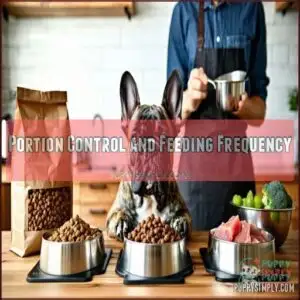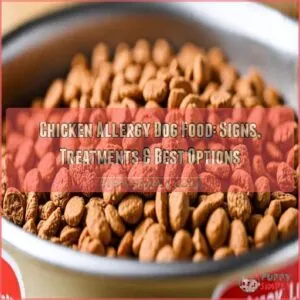This site is supported by our readers. We may earn a commission, at no cost to you, if you purchase through links.
 Your Frenchie deserves food that addresses their unique needs.
Your Frenchie deserves food that addresses their unique needs.
The best food for French bulldogs contains high-quality animal proteins (25-30%) and moderate fat (12-16%) to support their muscular build without excess weight gain.
Look for options with limited ingredients to manage common allergies, plus glucosamine for joint health.
Royal Canin French Bulldog formula and Orijen Original top our recommendations, as they’re specifically designed to support brachycephalic breeds.
You’ll want to avoid fillers like corn and wheat.
Remember, your Frenchie’s kibble size matters too—those flat faces need specially shaped pieces that they can easily pick up and chew.
Table Of Contents
- Key Takeaways
- Top 9 Best Foods for French Bulldogs
- 1. Orijen Original Grain Free Dog Food
- 2. Blue Buffalo Healthy Weight Dog Food
- 3. Nulo Freestyle Grain Free Dog Food
- 4. Royal Canin French Bulldog Adult Dry Dog Food
- 5. Purina Pro Plan Small Breed Chicken Rice Dog Food
- 6. Honest Kitchen Grain Free Dehydrated Chicken Dog Food
- 7. Small Breed Adult Dog Food
- 8. Diamond Naturals Small Breed Chicken Rice Dog Food
- 9. Farmina Lamb Grain Free Small Bites Dog Food
- Key Nutritional Needs of French Bulldogs
- Puppy Food Recommendations for French Bulldogs
- Adult French Bulldog Food Considerations
- Senior French Bulldog Diet Needs
- Managing Allergies and Food Sensitivities in French Bulldogs
- Importance of Feeding Based on Life Stage
- French Bulldog Weight Management Tips
- Transitioning Foods for French Bulldogs Safely
- Foods to Avoid and Must-Have Ingredients
- Frequently Asked Questions (FAQs)
- What is the best food to feed my French Bulldog?
- Is dry food better for French Bulldogs?
- What should I not feed my Frenchie?
- What is the best dry dog food for French Bulldogs?
- What is the recommended diet for a French Bulldog?
- Can French Bulldogs eat dry dog food?
- Are there any brands of food for French Bulldogs?
- Do older Frenchies need more protein… or less?
- What’s the best food for a French bulldog puppy?
- What’s the best food to give a French Bulldog?
- Conclusion
Key Takeaways
- Look for food with high-quality animal proteins (25-30%) and moderate fat (12-16%) to support your Frenchie’s muscular build without causing weight gain.
- Choose limited-ingredient formulas with glucosamine for joint health, especially for a breed prone to joint issues and allergies.
- Select kibble specifically designed for brachycephalic breeds, as your Frenchie’s flat face requires specially shaped pieces they can easily pick up and chew.
- Adjust your Frenchie’s diet based on their life stage – puppies need more calcium and calories, adults need balanced nutrition with proper protein-to-fat ratios, and seniors need higher protein with joint-supporting ingredients.
Top 9 Best Foods for French Bulldogs
Choosing the right food for your French Bulldog can feel overwhelming, but it doesn’t have to be.
These top nine options are packed with the nutrients your Frenchie needs to stay healthy, happy, and energetic every day.
1. Orijen Original Grain Free Dog Food
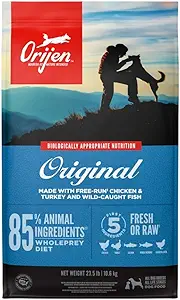
Orijen Original Grain Free Dog Food is a powerhouse choice for your Frenchie.
This grain-free recipe is made with 85% premium animal ingredients, mimicking a natural prey-based diet. Real chicken, turkey, and wild-caught fish are the first ingredients.
It’s nutrient-dense yet free of unnecessary fillers like potatoes or tapioca. It’s packed with omega fatty acids for healthy skin and a shiny coat, and includes probiotics for digestion.
French Bulldogs thrive on nutrient-dense foods that pack essential vitamins without unnecessary fillers—their health depends on quality ingredients.
While it’s pricier, the quality justifies the cost, keeping your pup happy and thriving.
Best For: Pet owners seeking high-quality, protein-rich, grain-free food for their dogs with sensitive digestion and skin needs.
- High in premium animal-based protein for a prey-like diet.
- Packed with omega fatty acids for skin and coat health.
- Includes probiotics for improved digestion.
- Expensive compared to other dry dog food options.
- Not suitable for dogs needing grain-inclusive diets.
- Kibble size may not suit very small breeds.
2. Blue Buffalo Healthy Weight Dog Food
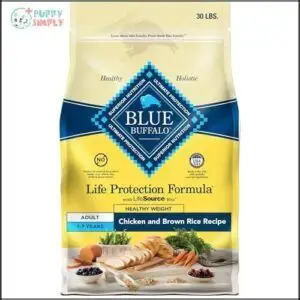
Packed with nutrient-rich ingredients, Blue Buffalo Healthy Weight Dog Food is a fantastic choice if your French Bulldog needs weight management.
It features real chicken as the first ingredient, providing high-quality protein to promote lean muscle. Enhanced with L-Carnitine, it helps convert fat into energy, keeping your pup active without unnecessary weight gain.
Plus, glucosamine and chondroitin support joint health, while whole grains, veggies, and fruits deliver essential nutrients. With no artificial additives, this formula prioritizes health and taste for your Frenchie’s happiness.
Best For: French Bulldogs needing weight management, joint support, and a balanced, nutritious diet.
- Real chicken supports lean muscle development.
- L-Carnitine promotes fat-to-energy conversion for weight control.
- Free from artificial additives, prioritizing health and taste.
- Slightly more expensive than some other brands.
- No zippered closure for maintaining bag freshness.
- Limited availability in some regions.
3. Nulo Freestyle Grain Free Dog Food
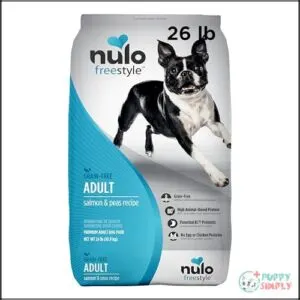
Regarding meeting your French Bulldog’s nutritional needs, Nulo Freestyle Grain-Free Dog Food stands out with its salmon and peas recipe.
With 80% animal-based protein, this food guarantees strong muscles and sustained energy. It’s also rich in omega fatty acids for a shiny coat and skin health.
The added probiotics enhance digestion, while low glycemic ingredients maintain stable blood sugar levels.
Free of fillers like corn and soy, it’s ideal for dogs with allergies—your Frenchie’s health deserves nothing less!
Best For: French Bulldogs or dogs with sensitive digestion and allergies who need a high-protein, grain-free diet.
- Rich in omega fatty acids for skin and coat health.
- Contains probiotics for improved digestion.
- Free from common allergens like corn, wheat, and soy.
- Strong salmon scent may not appeal to all dogs.
- May cause digestive adjustment issues like increased gas.
- Higher price point compared to similar dog food options.
4. Royal Canin French Bulldog Adult Dry Dog Food
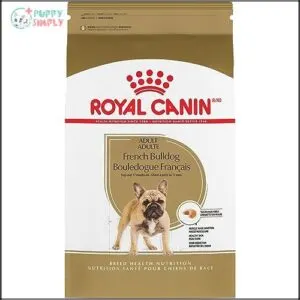
Royal Canin French Bulldog Adult Dry Dog Food is specially designed for your Frenchie, addressing their unique needs with ease. The customized kibble shape suits their brachycephalic jaw, making mealtime less of a challenge.
Packed with digestible proteins and fibers, this formula promotes digestion and reduces flatulence, a common woe for Frenchie owners.
Essential nutrients like L-carnitine support muscle tone, while omega fatty acids keep their coat healthy.
Though slightly pricey, its breed-specific benefits make it a worthwhile investment for your furry companion’s well-being.
Best For: Owners of French Bulldogs aged 12 months and older seeking breed-specific kibble that supports digestion, muscle tone, and healthy skin.
- Designed specifically for French Bulldogs’ brachycephalic jaw for easier eating.
- Promotes digestion and reduces flatulence with digestible proteins and fibers.
- Supports muscle tone and healthy skin with L-carnitine and omega fatty acids.
- Higher price point compared to general dog food.
- Reports of digestive issues (gas) in some dogs.
- Mixed customer experiences with variable results.
5. Purina Pro Plan Small Breed Chicken Rice Dog Food
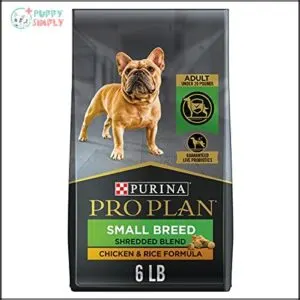
Purina Pro Plan Small Breed Chicken Rice Dog Food is a top choice for your Frenchie.
Packed with real chicken for muscle maintenance, this high-protein formula supports active small breeds.
The added probiotics boost digestion and immune health, while omega fatty acids promote a shiny coat, addressing common skin issues.
Its shredded pieces and kibble texture appeal to even picky eaters, and it’s easy to chew for dogs with dental concerns.
Affordable and vet-recommended, it’s ideal for sensitive stomachs and senior dogs alike.
Best For: Owners of small, active dogs, including senior and picky eaters, looking for a high-protein, easy-to-digest option.
- High-protein formula supports energy and muscle maintenance.
- Includes probiotics for digestive and immune health.
- Suitable for picky eaters and dogs with dental concerns.
- Limited to small bag sizes.
- Transitioning from other foods may require adjustment.
- Contains common allergens like wheat and corn.
6. Honest Kitchen Grain Free Dehydrated Chicken Dog Food
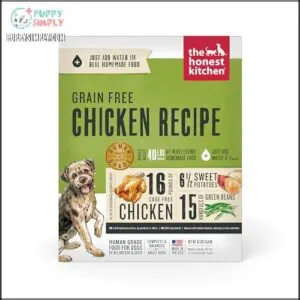
Considering the Honest Kitchen Grain Free Dehydrated Chicken Dog Food for your French Bulldog is a smart move.
Made with 100% human-grade ingredients like cage-free chicken, apples, and sweet potatoes, it’s both wholesome and nutritious.
This grain-free option is excellent for dogs with sensitivities, supporting overall digestion and improving skin and coat health.
Plus, it’s easy to prepare—just add warm water.
While it’s more expensive, its nutrient density and benefits, especially for picky eaters and those with allergies, make it worth the splurge, offering overall digestion support.
Best For: Dogs of all breeds and sizes, especially those with sensitivities, picky eaters, or digestive issues.
- Higher price point compared to other dog foods.
- Packaging may need improvement for convenience.
- Requires preparation time unlike kibble.
- Made with 100% human-grade and nutritious ingredients.
- Grain-free recipe supports sensitive stomachs and allergies.
- Easy to prepare with just warm water.
7. Small Breed Adult Dog Food
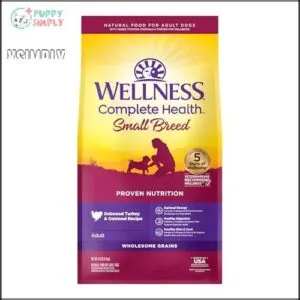
You’ll find that small breed adult dog food offers the perfect nutritional profile for your French Bulldog’s unique needs.
These specialized formulations contain higher caloric density to match your Frenchie’s elevated metabolism while featuring smaller kibble sizes that accommodate their distinctive facial structure.
Quality options include real chicken as the primary protein source for muscle maintenance, digestible rice carbohydrates for sustained energy, and beneficial probiotics to support digestive health.
The balanced blend of proteins, fats, and carbohydrates helps maintain ideal weight while supporting immune function—particularly important for brachycephalic breeds like French Bulldogs that face specific health challenges.
Best For: French Bulldogs and small breed adult dogs with specialized dietary needs, including those requiring higher caloric density and smaller kibble sizes.
- Higher caloric density tailored for small breed metabolisms.
- Smaller kibble size designed for easier chewing for brachycephalic breeds.
- Includes probiotics and balanced nutrients for digestive and immune health.
- Limited protein choices may not suit dogs needing novel proteins for allergies.
- Higher caloric content requires careful portion control to prevent weight issues.
- Not all formulas are grain-free, which may be problematic for sensitive dogs.
8. Diamond Naturals Small Breed Chicken Rice Dog Food
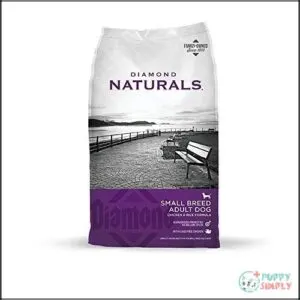
Value-conscious pet parents will appreciate Diamond Naturals Small Breed formula with its real cage-free chicken and thoughtfully designed small kibble size.
This USA-made option packs impressive nutrition with 27% protein and 16% fat to support your Frenchie’s lean muscle development.
You’ll find a complete blend of superfoods, probiotics (220 million CFU/kg), and omega fatty acids without corn, wheat, or soy fillers. The high digestibility guarantees your French Bulldog actually absorbs those nutrients.
At 345 calories per cup, it provides balanced energy for your small breed’s active lifestyle.
Best For: Small breed dog owners seeking high-quality, nutrient-dense food made with real chicken and no fillers.
- Only available in an 18 lb bag size.
- Some dogs may not prefer the taste.
- Reports of delivery delays from certain retailers.
- Real cage-free chicken for lean muscle support.
- High digestibility with probiotics for better nutrient absorption.
- No corn, wheat, or soy in the ingredients.
9. Farmina Lamb Grain Free Small Bites Dog Food
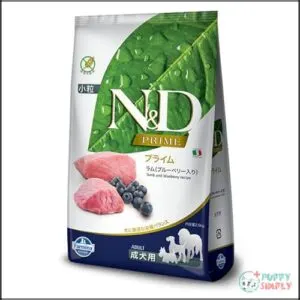
For French Bulldogs with sensitive stomachs, Farmina Lamb Grain-Free Small Bites Dog Food offers an excellent solution. The small pebble-like kibble is perfectly sized for your Frenchie’s mouth.
Lamb meat as the primary ingredient provides high-quality protein without common allergens.
This formula meets AAFCO requirements for all life stages, containing glucosamine and chondroitin sulfate for joint support.
Many pet parents report improved digestion after switching to this food. Available in 5.5-pound bags, it’s a complete, nutrient-rich option that supports your Frenchie from puppyhood through their senior years.
Best For: French Bulldogs of all life stages, especially those with sensitive stomachs or dietary allergies.
- Small pebble-like kibble ideal for French Bulldogs’ small mouths
- Lamb as the primary ingredient provides high-quality, allergy-friendly protein
- Contains glucosamine and chondroitin for joint support
- Only available in limited bag sizes (5.5-pound bags)
- Some customers report occasional issues with taste or freshness
- Grain-free formula might not suit all dogs’ nutritional preferences
Key Nutritional Needs of French Bulldogs
Your Frenchie’s health depends on a balanced diet with high-quality animal proteins, essential fatty acids, and proper macronutrient ratios suited to their unique needs.
You’ll need to adjust their nutritional intake based on life stage, with puppies requiring more calcium and calories while senior dogs need increased protein and joint-supporting ingredients.
Importance of Animal-Based Proteins
In regards to your Frenchie’s health, animal-based proteins serve as the cornerstone of their diet. These proteins provide essential amino acids that plant sources simply can’t match.
- High-quality protein content supports muscle development and maintenance
- Animal proteins offer complete amino acid profiles for ideal health
- Meat benefits include better digestibility than plant alternatives
- Fish oil provides additional protein while supporting coat health
- The best French bulldog diet prioritizes real meat as the first ingredient
Role of Fats for Energy and Hormone Support
After proteins, fats are the powerhouse of your Frenchie’s diet.
They’re not just an energy source but act as carriers for fat-soluble vitamins A, D, E, and K.
Quality fats support hormone regulation and maintain that adorable coat’s shine.
Omega-3s help manage inflammation, while cellular function depends on proper fat intake.
The best French Bulldog diet includes balanced fats (10-15%) from fish oils and quality animal sources, with a focus on proper fat intake.
Optimal Macronutrient Ratios for French Bulldogs
Now that we’ve explored how fats fuel your Frenchie’s energy needs, let’s look at their overall nutrient balance. Your French Bulldog thrives on specific macronutrient ratios:
- Adult Frenchies need roughly 25-30% protein, 15-20% fat, and 50-60% carbohydrates
- Puppies require higher protein (28%) and fat (17%) for proper growth
- Seniors benefit from increased protein (35-40%) with reduced fats (10-15%)
Each life stage demands different calorie intake based on activity level and metabolism
Essential Vitamins and Minerals
Beyond macronutrients, your Frenchie needs specific vitamins and minerals to thrive.
These micronutrients work behind the scenes to support everything from bone development to immune function.
| Nutrient | Function | Key Sources | Daily Need | Signs of Deficiency |
|---|---|---|---|---|
| Calcium | Bone strength | Meat meals, bone meal | 1.0-1.8% | Weak bones, growth issues |
| Phosphorus | Works with calcium | Meat, fish | 0.8-1.6% | Poor growth, weakness |
| Vitamin E | Antioxidant protection | Fish oil, seeds | 50-100 IU | Poor coat, muscle weakness |
| Vitamin D | Calcium absorption | Fish, egg yolks | 500-3000 IU | Rickets, joint problems |
| Omega-3 | Anti-inflammatory | Fish oil, flaxseed | 0.5-2% | Dry skin, inflammation |
Puppy Food Recommendations for French Bulldogs
Your French Bulldog puppy needs specialized nutrition with higher calcium and protein levels to support proper growth during this critical life stage.
Look for foods specifically labeled "for Growth" or "All Life Stages" that meet AAFCO guidelines, such as Wellness Complete Health Puppy or Orijen Original, to give your little Frenchie the best start possible.
A balanced, nutrient-rich diet is your Frenchie’s foundation for a healthy, happy, and energetic life.
High-Calorie Needs for Growth
Your French Bulldog puppy’s growth requires substantially higher calorie intake than adult dogs.
Their rapidly developing bodies need 30-35 calories per pound of body weight daily to fuel proper development.
Providing the right high calorie options is vital for their healthy growth.
- Watching your tiny Frenchie transform into a muscular little tank through proper nutrition
- Celebrating each growth milestone with the perfect nutritional support
- Witnessing their boundless puppy energy when properly fueled
- Finding joy in their healthy appetite for high-quality protein
- Seeing their coat shine with healthy nutrition
AAFCO Guidelines for Puppy Growth
When selecting puppy food for your Frenchie, always look for the AAFCO statement indicating it’s formulated for "Growth" or "All Life Stages."
This guarantees the food meets specific nutritional requirements for French bulldog puppies, including proper calcium-to-phosphorus ratios vital for bone development.
The best puppy food for Frenchies will follow these standards, providing balanced nutrition during critical growth stages without excessive calories.
French bulldog owners can also consider Puppy Food AAFCO standards when evaluating nutritional content.
Importance of Gradual Food Transition
A three-step changeover is essential when introducing your French bulldog puppy to new food.
Abrupt switches can trigger digestive upset, vomiting, or diarrhea.
Start with 75% old food and 25% new food for three days. Then, mix equal portions for another three days.
Finally, shift to 25% old and 75% new before completing the changeover.
Your Frenchie’s sensitive stomach will thank you! Understanding proper puppy food transition is key for their health.
Adult French Bulldog Food Considerations
You’ll need to adjust your Frenchie’s diet as they mature from puppyhood to adulthood, focusing on balanced nutrition with proper protein-to-fat ratios and appropriate calorie control.
Adult French Bulldogs require about 25-30 calories per pound of body weight, with specific attention to joint-supporting ingredients and digestive health supplements to address their breed-specific needs.
Protein and Fat Balance for Active Adults
Now that your Frenchie has moved from puppyhood to adulthood, getting the right protein and fat balance is key to keeping them energetic and healthy.
Active adult French Bulldogs thrive with a specific macronutrient balance suited to their unique physiology.
- Protein sources should comprise 25-30% of your Frenchie’s diet, with high-quality protein like beef or salmon listed first on ingredients
- Fat ratios typically fall between 12-16% for ideal energy without weight gain
- Adult Frenchies require approximately 25-30 calories per pound of body weight
- Nutrient density matters more than volume—choose foods with substantial meat content
- The best dog food for Frenchies contains minimal fillers and maximum bioavailable nutrients
Managing Weight With Calorie Control
While protein and fat quality matters, controlling calories is equally important for your Frenchie’s waistline.
Adult French Bulldogs require about 25-30 calories per pound of body weight daily. Your pup’s activity level drastically affects these needs—neutered dogs may need 30% less food!
Establish regular feeding schedules and measure portions carefully to prevent the all-too-common "Frenchie chonk" that can lead to health issues.
Considering a raw food diet can also have significant benefits for their overall health and wellbeing.
Foods for Joint and Digestive Health
Your Frenchie’s internal health deserves special attention, especially for those with sensitive stomachs or joint issues.
Consider these powerhouse options:
- Bone broth containing natural collagen and glucosamine for joint support
- Pumpkin as a fiber source that regulates digestion and eases bathroom trips
- Foods with prebiotics and probiotics to maintain gut flora balance and reduce flatulence
For French Bulldogs with food allergies, hydrolyzed protein formulas provide digestive enzymes that break down nutrients more effectively.
Additionally, incorporating raw egg benefits can enhance their overall nutrition and well-being.
Senior French Bulldog Diet Needs
You’ll need to adjust your senior Frenchie’s diet to include more protein for muscle maintenance while reducing overall calories to prevent weight gain.
Look for specially formulated senior foods containing joint-supporting ingredients like glucosamine and chondroitin to help your aging companion stay mobile and comfortable, with a focus on muscle maintenance.
Higher Protein for Muscle Maintenance
As your senior Frenchie ages, their muscle tissue naturally begins to decline, making higher protein intake essential for muscle maintenance.
You’ll want to look for foods with high-quality protein sources like real meat or fish as the first ingredient.
Senior French bulldogs need approximately 25-30% protein content in their diet to combat age-related muscle loss.
Quality matters more than quantity—opt for nutrient-dense protein sources that support your aging companion’s muscle health.
Lower Caloric Needs to Prevent Weight Gain
While protein remains important, as your Frenchie ages, their metabolism slows dramatically. Your senior companion now needs fewer calories to prevent unhealthy weight gain.
For effective french bulldog weight management:
- Reduce daily portions by 20-30% compared to adult feeding guidelines
- Look for "senior" or "light" formulas with lower calorie density
- Monitor weight monthly and adjust portion sizes accordingly
Even small weight gains can stress aging joints and worsen breathing issues in older Frenchies, making effective weight management crucial.
Foods With Joint Support Ingredients
As your senior Frenchie slows down, their joints need extra TLC.
Look for foods packed with joint-supporting ingredients to keep them comfortable and mobile.
| Ingredient | Benefit | Found In |
|---|---|---|
| Glucosamine | Rebuilds cartilage | Green-lipped mussel |
| Chondroitin | Prevents cartilage breakdown | Bone broth |
| Omega-3s | Reduces inflammation | Fish oil supplements |
These anti-inflammatory compounds work together to maintain cartilage health and improve mobility in aging French Bulldogs, with joint-supporting ingredients.
Managing Allergies and Food Sensitivities in French Bulldogs
You’ll need to identify and eliminate specific trigger foods if your Frenchie shows signs of itching, digestive upset, or ear infections.
Limited-ingredient diets with novel proteins like venison or salmon can dramatically reduce allergic reactions while providing the complete nutrition your sensitive French Bulldog needs.
Common Allergens to Avoid (e.g., Corn, Chicken)
French Bulldogs’ delicate digestive systems often react negatively to certain ingredients in their food.
Watch for these common allergens that can trigger food allergies in your Frenchie:
- Corn – A low-cost filler that frequently causes digestive upset
- Chicken – Surprisingly, this protein is a top allergen for sensitive stomach French Bulldogs
- Wheat – Can trigger inflammatory responses in many Frenchies
- Soy – Often leads to skin irritation and gastrointestinal issues, which can be a significant concern for French Bulldogs.
Benefits of Limited-Ingredient Diets
Now that you know what allergens to watch for, let’s look at why limited-ingredient diets (LIDs) might be your Frenchie’s best friend.
LIDs offer remarkable benefits for French bulldogs with food allergies or sensitive stomachs. With fewer ingredients, these diets make allergy management simpler through nutritional transparency.
| Benefit | How It Helps Your Frenchie |
|---|---|
| Easier Diagnosis | Simplifies elimination diet process |
| Reduced Reactions | Fewer ingredients mean fewer potential triggers |
| Digestive Comfort | Simplified ingredient profiles improve digestion |
| Weight Regulation | Controlled formulations support healthy weight |
| Symptom Relief | Clearer skin, less scratching, better stools |
Recommended Grain-Free or Hypoallergenic Options
Finding grain-free or hypoallergenic options for your Frenchie can be a game-changer when dealing with allergies. These specialized formulas eliminate common triggers while providing essential nutrition.
- Look for novel proteins like duck, rabbit, or venison that your dog hasn’t been exposed to previously.
- Choose foods with hydrolyzed proteins that break down allergens into smaller, non-reactive particles.
- Select options with digestive enzymes and probiotics to support gut health alongside allergy management.
Importance of Feeding Based on Life Stage
You’ll need to adjust your Frenchie’s diet as they grow from playful puppy to dignified senior to meet their changing nutritional requirements.
Feeding age-appropriate food guarantees they receive the correct balance of protein, calories, and nutrients for their specific life stage. This directly impacts their overall health and longevity.
Puppy Stage: Nutritional Essentials
Every French bulldog puppy requires specific nutritional essentials to support healthy development.
Your puppy’s food should meet AAFCO guidelines for growth with appropriate calcium levels.
| Nutrient | Requirement | Benefits |
|---|---|---|
| Calcium | 1.2-1.8% | Proper bone development |
| Protein | 22-26% | Muscle growth |
| DHA/ARA | 0.1-0.2% | Brain development |
| Calories | 40-55 cal/lb | Energy for growth |
| Probiotics | 100+ million CFU | Digestive health support |
Growth-supportive diets with meat-based proteins provide balanced macronutrients your Frenchie needs, ensuring proper bone development and digestive health support.
Adult Stage: Maintaining Optimal Health
Your adult Frenchie deserves the best nutrition during their prime years.
At this stage, they need a proper nutrient balance of 25-30 calories per pound with moderate protein levels. Activity levels substantially impact dietary needs, so adjust accordingly.
Monitor their weight regularly and watch for allergic reactions to common ingredients like chicken or beef.
The best food for French bulldogs in adulthood supports overall wellness through consistent health monitoring. Ensuring proper calorie intake management is vital for maintaining their health and providing the necessary wellness.
Senior Stage: Adjusting for Aging Needs
Your Frenchie’s senior years bring new nutritional challenges that require thoughtful adjustments to their diet.
Senior Frenchies need specialized nutrition for healthy aging:
- Higher protein foods (28-30%) to combat age-related muscle loss
- Lower calorie formulations to prevent weight gain
- Added glucosamine and chondroitin for joint support
- Omega-3 fatty acids for cognitive health
Choose senior dog food with these elements to keep your aging French bulldog comfortable and healthy throughout their golden years with the right balance of nutrients, including joint support.
French Bulldog Weight Management Tips
You’ll need to monitor your Frenchie’s weight closely, as these adorable bulldogs can quickly pack on extra pounds that worsen their breathing issues and joint health.
Maintaining proper portion control and selecting foods with appropriate calorie density will help your French Bulldog stay at an ideal weight while still getting all the nutrients they need.
Portion Control and Feeding Frequency
Just as your French Bulldog has unique nutritional needs at different life stages, proper portion control is key to maintaining their health.
Feed adult Frenchies twice daily, while puppies need three to four smaller meals to support growth. Rather than guessing meal sizes, adjust portions based on weight and activity level.
Regularly monitor your pup’s body condition—you should feel ribs without seeing them. Remember, overfeeding can lead to obesity and health issues.
A well-planned raw food diet can also contribute to a French Bulldog’s overall health and happiness.
Foods With Low-Calorie Density
Low-calorie density foods can be your Frenchie’s best friend for weight management.
Look for options specifically formulated with:
- High fiber content that keeps your pup feeling full longer
- Lean protein sources that maintain muscle without excess calories
- Natural vegetables that provide nutrients without caloric density
Blue Buffalo Healthy Weight and Royal Canin Weight Control offer excellent low-calorie options while maintaining nutrient balance for sensitive stomachs and digestive health.
They are formulated to provide a balanced diet for your pet.
Avoiding Obesity-Exacerbating Ingredients
Beyond selecting low-calorie options, watch out for ingredients that can pack on pounds in your Frenchie.
Ingredients in many commercial foods can secretly contribute to weight gain in French Bulldogs.
Be vigilant about checking labels for:
| Ingredient Type | Impact on Weight | Better Alternatives |
|---|---|---|
| Corn syrup/sugar | Rapid fat storage | Natural fruit extracts |
| Cheap fillers (corn, wheat) | Empty calories | Vegetables, lentils |
| High-fat animal by-products | Unhealthy fat increase | Named meat sources |
| Artificial flavor enhancers | Increased overeating | Natural flavors |
Always choose healthy French Bulldog food with balanced nutrient profiles to maintain ideal weight and prevent unhealthy fat increase.
Transitioning Foods for French Bulldogs Safely
You’ll need to switch your Frenchie’s food gradually over 7-10 days to prevent digestive upset that can leave your pup miserable.
Mixing increasing amounts of the new food with decreasing amounts of the old food gives your French Bulldog’s sensitive stomach time to adjust to the change.
Importance of Gradual Changes Over 7–10 Days
Rushing into a new diet can upset your Frenchie’s delicate digestive system.
A gradual food changeover over 7-10 days is essential for switching dog food safely:
- Day 1-3: Mix 25% new food with 75% old food
- Day 4-6: Increase to 50/50 mixture
- Day 7-8: Switch to 75% new and 25% old food
- Day 9-10: Complete changeover to 100% new food
Monitoring Stool Consistency During Transition
Your dog’s poop tells an important story during food adjustments.
Watch for stool consistency daily – healthy stools should be firm but not hard, chocolate-brown, and formed. Loose, watery stools or constipation signal that you’re moving too quickly with the new food.
Color variations insights can reveal food allergies, especially important for French Bulldogs with sensitive stomachs.
Tracking progress through stool monitoring keeps digestive health at its best.
Adjusting Portions to Avoid Overfeeding
When shifting your Frenchie to new food, you’ll need to adjust portions to avoid overfeeding.
The best food for French Bulldogs comes with feeding guidelines, but these aren’t one-size-fits-all. Monitor weight trends weekly and adjust accordingly.
Measure food accurately using a digital scale rather than eyeballing it. Remember that caloric needs adjustment is necessary based on your dog’s ideal body condition, activity level, and potential sensitive stomach issues.
Foods to Avoid and Must-Have Ingredients
You’ll need to know what ingredients can harm your Frenchie and which nutrients will help them thrive for peak health.
When choosing food for your French Bulldog, look for high-quality animal proteins and beneficial supplements like omega fatty acids and probiotics while avoiding common allergens and low-quality fillers.
Low-Quality Fillers Vs. High-Quality Proteins
Now that you’ve learned how to safely introduce new foods, let’s look at what should be in your Frenchie’s bowl.
Your French Bulldog deserves better than cheap fillers. While corn, wheat, and soy pad out dog food bags, they offer little nutritional value.
A thorough dog food ingredients list prioritizes essential nutrients.
Instead, choose foods listing real meat first—chicken, turkey, or fish provide essential amino acids that support your pup’s muscle health.
High-quality proteins are the cornerstone of good French Bulldog nutrition, and they should be the main focus when selecting a dog food.
Benefits of Omega Fatty Acids and Probiotics
While quality proteins form the foundation of your Frenchie’s diet, don’t overlook the power-packed extras.
Omega-3 fatty acids reduce inflammation and promote a gleaming coat, while probiotics work wonders for sensitive stomachs common in French bulldogs.
The best dog food for Frenchies includes these gut health champions that boost immune function. When examining ingredient lists, prioritize foods containing salmon oil (rich in omegas) and beneficial bacteria cultures for superior French bulldog nutrition.
Essential Nutrients for Breed-Specific Health
Every French Bulldog thrives on specific nutrients formulated to their unique breed characteristics.
Your Frenchie needs glucosamine and chondroitin for joint health, taurine for heart function, and DHA for brain development.
Protein sources like fish and lamb support muscle maintenance while fatty acids reduce inflammation in brachycephalic breeds.
Nutrient balance is essential—look for calcium-phosphorus ratios suitable for bone development and antioxidants that combat oxidative stress common in sensitive stomach French Bulldog food options.
Frequently Asked Questions (FAQs)
What is the best food to feed my French Bulldog?
Choosing the right food for your French Bulldog is key.
Look for high-protein options like Wellness Complete Health Puppy or Orijen Original.
Verify that it meets AAFCO guidelines, supports growth, and avoids fillers to maintain health.
Is dry food better for French Bulldogs?
Dry food offers dental benefits and convenience for your Frenchie, but isn’t necessarily better than wet food.
You’ll want to choose high-quality options specifically formulated for small breeds with appropriate kibble size.
What should I not feed my Frenchie?
Like a minefield for your pup’s health, avoid chocolate, grapes, onions, garlic, xylitol, caffeine, alcohol, raw dough, high-salt foods, and common allergens like chicken, beef, and dairy.
What is the best dry dog food for French Bulldogs?
Top dry dog foods for your Frenchie include Royal Canin French Bulldog Adult, Wellness Complete Health, and Orijen.
Look for high-quality proteins, limited ingredients, and breed-specific formulations that support their unique nutritional needs.
What is the recommended diet for a French Bulldog?
French Bulldogs need high-protein diets with quality animal proteins.
Limited ingredients are important for allergy management. Appropriate nutrients for their life stage are also essential.
You’ll want foods specifically formulated for small breeds with proper kibble size.
Can French Bulldogs eat dry dog food?
Hitting the nail on the head, dry dog food is perfectly suitable for your French Bulldog.
You’ll want to choose high-quality kibble specifically formulated for small breeds with appropriate nutrients for their needs.
Are there any brands of food for French Bulldogs?
Yes, several top-rated brands for your Frenchie include Royal Canin French Bulldog, Hill’s Science Diet, Blue Buffalo, Wellness Complete Health, Orijen, Merrick, and Canidae.
Each offers formulas suited to their unique nutritional needs, which is a key factor in choosing the right food for your pet, with complete concepts of nutrition in mind.
Do older Frenchies need more protein… or less?
You’d think older Frenchies would need less protein, but it’s actually the opposite.
Your senior Frenchie needs more protein to replace muscle tissue that naturally deteriorates with age, despite needing fewer calories overall.
What’s the best food for a French bulldog puppy?
Your puppy needs food labeled "for Growth" or "All Life Stages" that meets AAFCO guidelines.
Top options include Wellness Complete Health Puppy and Hill’s Science Diet with appropriate calcium levels for proper development.
What’s the best food to give a French Bulldog?
Like a guardian angel for your Frenchie’s health, high-quality protein-rich foods are essential.
Choose options like Royal Canin, Wellness, or Fromm that match your dog’s life stage and address breed-specific needs.
Conclusion
When all is said and done, choosing the best food for French Bulldogs isn’t rocket science.
It’s about finding high-quality options with proper protein levels, limited ingredients, and joint-supporting nutrients.
Whether you select Royal Canin’s breed-specific formula or Orijen’s protein-rich kibble, you’re investing in your Frenchie’s long-term health.
Remember to switch foods gradually and monitor your pup’s response. Your flat-faced friend deserves nutrition that addresses their unique needs—their wiggly tail will thank you!
- https://tomkingskennel.com/best-food-for-french-bulldog/
- https://www.halocollar.com/what-is-the-best-dog-food-for-french-bulldogs/?srsltid=AfmBOopfN0jhvojW4xkR1um5R0xwCjqYLkFPKJUNMugWtPcOWOIPp1HU
- https://www.tractorsupply.com/a/top-rated-dog-food-for-french-bulldogs?srsltid=AfmBOootS-C7-i2moP_Eq1-9C443dDg39VJU-QK5rx3Dgwa0kga2R08Z
- https://www.bellaandduke.com/dogs/expert-advice/dog-breeds/health-issues-of-french-bulldogs-and-the-best-food-for-them/?srsltid=AfmBOopg2Iml5vULgtIDpe4ZhjvqoKlT7UKrfkel4HI_KuCCPjaYLXBL
- https://thefabfunfrenchie.com/what-is-the-best-dog-food-for-frenchies/









